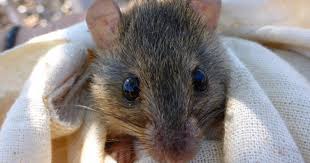Creatures in the news — winged, four-footed, cute or scary
As someone who can't stand fish, fake fish does absolutely nothing for me. A wise man once said "If God had meant people to eat fish, She wouldn't have put them under water".
“Fish is loaded with important nutrients, such as protein and vitamin D. Fish is also the world's best source of omega-3 fatty acids, which are incredibly important for your body and brain.May 24, 2015“
mtierney said:
“Fish is loaded with important nutrients, such as protein and vitamin D. Fish is also the world's best source of omega-3 fatty acids, which are incredibly important for your body and brain.May 24, 2015“
And mercury. Don't forget the mercury. Mercury makes you mad as a hatter, as they used to say.
Klinker said:
mtierney said:And mercury. Don't forget the mercury. Mercury makes you mad as a hatter, as they used to say.
“Fish is loaded with important nutrients, such as protein and vitamin D. Fish is also the world's best source of omega-3 fatty acids, which are incredibly important for your body and brain.May 24, 2015“
 Don’t forget the micro plastics! That’s the very latest findings (as of last month).
Don’t forget the micro plastics! That’s the very latest findings (as of last month).
A different kind of article: a camel train follows ancient trails and wells across Australia’s Simpson Desert, and finds rich archaeological records...
https://www.abc.net.au/news/2019-07-14/oasis-in-the-simpson-desert-rediscovered/11287328
I’m wondering if there’s a similar pelican project up your way? Do you know how far your birds travel?
Apparently, our pelicans find it normal to fly over 700km in one year, for suitable habitat and breeding grounds. Going by the flocks we see around my neighbourhood (further north than discussed in the article), I wouldn’t be surprised if some land up in PNG or further...
https://www.abc.net.au/news/2019-07-14/how-far-do-pelicans-travel-and-where-do-they-go/11305234
Another effect of climate change/global heating that we often forget to talk about, is that as water availability fluctuates, flowers don’t bloom in the usual seasonal patterns. And throws out the bees’ honey-making cycles.
Yep, our natural honey resources are threatened by more than the varroa mite.
https://www.abc.net.au/news/2019-07-14/honey-producers-hand-feeding-bees-to-survive-drought/11296038
Pelicans are astonishing animals. The degree to which they are adapted to their environment is incredible.
We love watching them. There's a bunch that currently hang around the houses opposite us on our lake, grabbing small insects and yabbies, and holding gossip parties on the lawns for hours... The boys (I think it's the boys) like to sit on top of the treet lights or high corners of roofs, maintaining a watchful eye for either danger or more tasty fish.
We've also got our regular visiting flock of jabiru (native stork), at least a dozen nesting on one of the waterlily islands in the lake. So pretty.
https://www.nytimes.com/2019/07/09/magazine/letter-of-recommendation-bird-feeders.html
Trying to cut and paste some excerpts of wonderful story for you, Joanne....
“Over the next few days, as I began a free fall into despair, I was surprised to find a quiet comfort in the birds flitting about my friend’s window. Suddenly, I grew envious of his yard, a seeming prerequisite for a feeder. Then it occurred to me: I am not the first apartment dweller with this predicament. I opened Amazon, where I’d been browsing for light-therapy lamps, and discovered feeders that could be attached to our apartment windows with suction cups. “I bought myself a Christmas present,” I told my wife when I arrived at my in-laws’ house.
When we returned to Brooklyn, a house-shaped plexiglass feeder and four pounds of Deluxe Treat birdseed were waiting. We thought the birds would find the feed in a day, maybe two. One month later, the feeder was still untouched. I visited online forums thinking I might find a solution. Instead, I found guys from the upper Midwest swapping recipes for bird feed rendered from deer fat and peanut butter. (I stopped reading at “I don’t boil the deer fat; I hang the rib cage full of the scraps.”) Somewhere, though, I had heard to spread seeds around the feeder, so I placed a handful on the windowsill. Three days later, my wife texted me a picture of a blue jay. More soon appeared. So did sparrows, nuthatches, cardinals, mourning doves and a single red-bellied woodpecker. Within two weeks, I was ordering 20-pound bags of birdseed, Eastern Regional Blend, and filling the feeder’s trough daily.
Initially, it was the sheer novelty that caught my attention. My phone couldn’t compete with a woodpecker eating two feet away. Then I started to actually notice the birds, the peculiar rituals and particular charms of each species. I saw the nuthatches creeping down the window frame vertically, like awkward thieves, and dashing in for single sunflower seeds. The fat, insatiable mourning doves gorging themselves on white millet. The cardinals loitering shyly in the pear tree, waiting for them to finish.
The novelty has faded over time. But the beauty of the birds continues to draw my attention. In the tableau of blues gridded across the jay’s wing and tail, I see patterns of a Mondrian. More than once I have begun to scare away greedy doves only to stop short at the gleam of iridescent plumage. In these moments, and in the daily routine of filling the feeder with seed, I forgot my anxieties.
“That something as simple as bird-watching could release me from the confines of my mind came as a surprise. When I began to struggle with depression, at an evangelical college, the faithful proffered a verse from the Gospel of Matthew: “Look at the birds of the air; they do not sow or reap or store away in barns, and yet your heavenly Father feeds them. Are you not much more valuable than they?” This provided exactly zero comfort. I wasn’t sure I still believed in a benevolent father. And besides, I’d seen enough dead birds in my cat’s maw to question their value in his eyes.
If the birds still don’t fill me with any divine reassurance, they provide something far more valuable: a respite, a chance to turn my attention away from myself to the grace and beauty of the world. I don’t know if God is feeding them, but I am.”
mtierney, I know you like our cute Aussie critters; I just started reading this morning’s news and saw this article
Aww, what a happy, lovely story!
Somehow, I sorta wish the tortoises could still live long happy lives in the wild though.
joanne said:
mtierney, I know you like our cute Aussie critters; I just started reading this morning’s news and saw this article
https://www.abc.net.au/news/2019-07-27/sex-charged-marsupial-missing-in-south-east-queensland/11348828
What a way to go!
Looks like many species of monkeys may soon be going the way of the Dodo.
Business Insider: Monkeys facing extinction due to climate change
Its interesting to note that the scientists in this study used a "best case scenario" for climate change as their baseline.
yes, Klinker, this was covered a couple of weeks ago in New Scientist in an issue that covered a wide range of impending extinctions. And coffee plants apparently won't be able to supply anywhere near sufficient usable berries within about 12 months. (They won't be able to mature properly)
Sorry. That sounds impatient and patronising. Not meant to, I'm fighting a dying battery.
joanne said:
And coffee plants apparently won't be able to supply anywhere near sufficient usable berries within about 12 months. (They won't be able to mature properly)
I am afraid to even ask but... what?
Klinker said:
joanne said:I am afraid to even ask but... what?
And coffee plants apparently won't be able to supply anywhere near sufficient usable berries within about 12 months. (They won't be able to mature properly)
Since the original research was widely published in January, the situation has become more dire, with many fires, quakes, landslides and continuing land clearing all at a faster pace than previously. So this has been a horror year. Further, economics/business press have reported that small farmers have been leaving their farms because they can't afford to continue any more.
https://phys.org/news/2019-06-climate-rethink-coffee-cocoa-production.html
Coffee growers here and in PNG are facing water issues. In Indonesia, there's been a problem with quakes, and flooding. Central America has all kinds of challenges including environmental.
how about insects in the news? What that bite is all about. 
https://www.nytimes.com/2019/07/27/opinion/sunday/mosquitoes-malaria-zika-history.html
Here, that’s almost old news, we get public health warnings each season as they update us on Dengue, Ross River fever and all other woes the mozzies and midges gift us.
Ewww, information I didn’t need to read — now it is yours!
https://www.nytimes.com/2019/07/31/science/black-widow-spider-males.html
A sweet story, also a necessary one now that we’re living and so are our companions
https://www.bbc.com/news/av/business-49449956/retirement-home-for-elderly-pets
Oh dear, now Nancy Drew is a male tortoise...! 
Great pet story from the UK
joanne said:
A sweet story, also a necessary one now that we’re living and so are our companions
https://www.bbc.com/news/av/business-49449956/retirement-home-for-elderly-pets
My 14? year old cat, gotten from a shelter in 2007, is failing. I have been adjusting to a once lively climber who now cannot get up on a chair. She still has her appetite, but now only eats “adult cat” stews and soups. She has arthritis in her hips. So my home has been made more comfortable for its two aging old ladies!
I heard the first one yesterday...
https://www.nytimes.com/2019/08/20/magazine/letter-of-recommendation-crickets.html
Here’s a feel-good story - after such a long time, lost pet returns home!
A heartwarming story about positive action to restore dwindling native bird numbers, by primary school students in a mining region
joanne said:
A heartwarming story about positive action to restore dwindling native bird numbers, by primary school students in a mining region
And I thought our New Jersey Gold Finch were spectacular! The end of the video was sad, however, in that the finches raised are no longer able to return to the wild. Wonderful opportunities for the students to participate in saving an endangered species hands on!
For Sale
Sponsored Business
Promote your business here - Businesses get highlighted throughout the site and you can add a deal.















and, now, we have fake fish in the news
https://www.nytimes.com/2019/07/10/business/fake-fish-impossible-foods.html